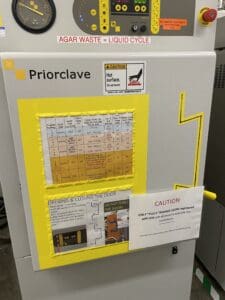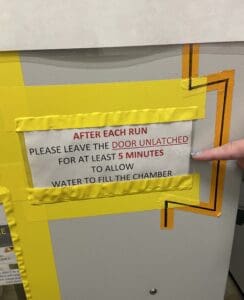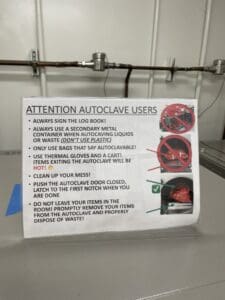Autoclave Training Tips with Instructional Support Technician Kelly McVey
By: Priorclave North America
Category: Lab Design

Kelly McVey is an Instructional Support Technician for the Department of Chemistry and Biochemistry at California State University, Fullerton. There, she’s trained hundreds of people in safe autoclave use, with trainees ranging from precocious high schoolers to undergrads, graduate students, and new researchers. Many assume that there’s a natural hierarchy here, with high schoolers the most likely to do something dangerously careless, and researchers just needing a walk-thru of the specific control layout of a given model of steam autoclave. But according to McVey, that is not at all the case: age, education level, and previous research or lab experience are not reliable indicators of how safely a person uses an autoclave.
“The only thing that tells me much is what they show up wearing,” she explains. “I tell everyone beforehand, ‘long pants, closed toe shoes.’ Students who aren’t all that serious show up in shorts, cropped pants, slip-ons or sandals. The ones who are really interested and serious want to make sure they have everything they need.”
So, if you’re running a training, take note of who shows up properly dressed and with pad and pencil; they’re the least likely to run into trouble.
The Fullerton Approach
There are three key elements to Kelly McVey’s training approach at CSU-Fullerton.
1. Online Webinar
Fullerton’s online webinar covers both autoclave safety fundamentals and the How and Why of autoclaving. “Once they’re aware of these,” McVey explains, “Understanding Why a given load type needs to be sterilized and How the steam accomplishes this, they do a really good job using the autoclave. It absolutely helps them if you link the how and the why.”
2. Hands-on Training with Technician
After completing the webinar, trainees have a hands-on session with a technician. Importantly, this is not training being done by another student, an instructor, or a PI (the “principal investigator” on a given project). This is the key to making sure everyone is consistently following the same procedures and sharing the resources well at Fullerton. (Trainees also have the option of requesting a lab technician be present the first time they’re called on to use the autoclave on their own, although McVey notes that few feel they need the added support at that stage.)
3. Good and Complete Signage
According to McVey, “We set it up so that it should be pretty much self-explanatory after you’ve had your training. All you have to remember is: 1) Follow your protocol; 2) if you forget, check the sign on the door.”





The Safest Training Autoclave
Kelly McVey has especially liked using Priorclave autoclaves for training students.
“Priorclaves are quite good for training and students…They’re safer. I like how confident I am in the safety of these autoclaves. You’re not worried about having the on-site boilers [required by other autoclaves], for example. I like how easy it is for us to lock it down if we have to, because we have the Emergency Stop.”
Priorclave’s Emergency Stop button is a keyed lockout (a style not available from all manufacturers). In an emergency, pushing in the Emergency Stop button will cut the electricity supply to the heaters and control system entirely, entirely halting the cycle. Most importantly, the Emergency Stop must be released using the key provided (which should be kept by responsible personnel in a safe place away from the autoclave, not accessible by unauthorized personnel). This absolutely prevents anyone from inadvertently wandering in and causing a simple mistake or low-level emergency to tip over into disaster. Outside of an emergency, the feature is a handy way to control when (and by whom) the autoclave is used—often valuable in an education setting, where some may have the tendency to overestimate their abilities or knowledge.

